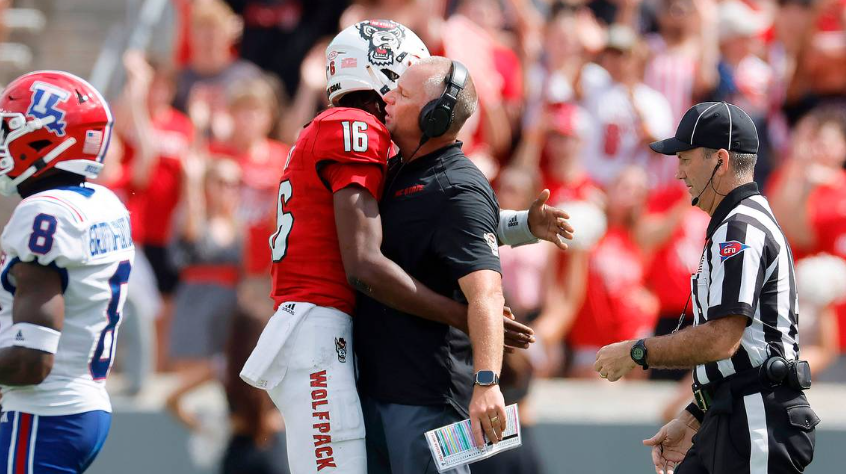
NC State’s Quarterback opens up about decision to retire from football

Grayson McCall, the former NC State quarterback, recently opened up to the media about his life-altering decision to retire from football due to the cumulative effects of head injuries. This marked a significant moment for the 23-year-old, who has spent much of his life dedicated to the sport. The announcement came shortly after he sustained his sixth concussion during a game against Wake Forest on October 5 at Carter-Finley Stadium. The hit was not just another injury; it became a turning point in McCall’s life, leading him to reassess his future and well-being.
Reflecting on that fateful moment, McCall recounted waking up in an ambulance, his mother by his side. The weight of the situation settled on both of them as they exchanged a look that conveyed a shared understanding: this was the end of his playing career. “Whenever I woke up in the ambulance and they took me to the hospital, I opened my eyes and my mom was right beside me,” McCall shared. “We kind of both looked at each other at the same time and said that’s it.” The gravity of those words hung in the air, underscoring the emotional toll of his decision.
McCall’s journey through college football has been marked by incredible highs and devastating lows. As a talented quarterback, he garnered attention and respect on the field, leading his team with skill and determination. However, the physical demands of the sport took a heavy toll on him. Each concussion, each injury, brought with it not just physical pain but a lingering anxiety about his long-term health. Despite his love for the game and the opportunities it provided, he recognized the necessity of prioritizing his well-being over the adrenaline of competition.
The decision to step away from football was not taken lightly. For many athletes, the sport becomes an integral part of their identity, shaping their lives, friendships, and aspirations. McCall had envisioned a future where he would continue to excel on the field, perhaps even pursuing a professional career. Yet, with each subsequent concussion, the reality of the situation became increasingly clear: the risks outweighed the rewards. “As much as I love this game and everything it’s done for me, I can’t put myself through that again,” he stated firmly.
As he transitions away from playing, McCall has decided to stay involved in football by taking on an assistant coaching role for the Wolfpack for the remainder of the season. This decision reflects his passion for the game, even as he steps away from the physical aspect of playing. Coaching offers a way for him to impart his knowledge and experiences to younger players, helping them navigate the complexities of the sport while emphasizing the importance of health and safety.
Looking ahead, McCall has aspirations beyond coaching; he envisions a life that includes marriage and fatherhood. In his heartfelt comments, he emphasized the desire for a “full life,” one that encompasses both personal happiness and professional fulfillment. “At the end of the day, I want to have a full life, I want to get married and have kids one day, and I want to be a football coach,” he explained. The decision to retire from playing was ultimately rooted in a profound understanding that maintaining a healthy brain was essential to achieving these goals.
In recent years, the conversation surrounding player safety in football has gained prominence, particularly regarding concussions and their long-term effects. McCall’s experience brings to light the urgent need for continued awareness and advocacy for player safety. With increased scrutiny on the impacts of head injuries, his decision to prioritize health serves as a poignant reminder of the sacrifices athletes make for their sport.
For many athletes, the transition from playing to coaching or other roles within the sport can be challenging. McCall’s journey will likely come with its own set of obstacles as he adjusts to life off the field. However, his commitment to staying involved and giving back to the sport he loves is commendable. By becoming a coach, he not only continues to share his passion but also has the opportunity to influence a new generation of players, ensuring they understand the importance of their health and well-being.
As McCall embarks on this new chapter, he will face the challenges of redefining his identity outside of being a player. This process can be daunting, especially for someone who has dedicated so much time and energy to achieving success on the field. Yet, McCall’s resilience and determination will undoubtedly serve him well. By embracing his role as a coach, he can channel his competitive spirit into mentoring others and contributing to the growth of the game.
The broader implications of McCall’s retirement extend beyond his personal story. They touch on the ongoing discussions regarding the responsibilities of colleges and professional leagues to protect their athletes. As players face the reality of career-ending injuries, it becomes increasingly vital for organizations to implement measures that prioritize health and safety. McCall’s decision is a testament to the importance of taking these issues seriously and advocating for change within the sport.
While stepping away from playing may feel like a loss, it can also be seen as an opportunity for growth. McCall’s journey reflects a broader societal shift toward prioritizing mental and physical health in athletics. As more athletes share their stories of injury and recovery, it fosters a culture of openness that encourages future players to prioritize their well-being. This shift can ultimately lead to a safer environment for athletes at all levels of the game.
As he moves forward, McCall will likely encounter both support and challenges as he carves out his new path. His decision to retire is not just about ending a career; it signifies a commitment to living a life that values health, family, and future aspirations. McCall’s story resonates with many, showcasing the human side of sports and the difficult choices athletes must confront.
The transition from player to coach may also provide McCall with a unique perspective, enabling him to empathize with the challenges faced by young athletes. He can share valuable insights on how to navigate the pressures of the sport while emphasizing the importance of mental health and injury prevention. His voice in the locker room will carry weight, and his personal experiences can serve as a guiding force for players who may find themselves in similar situations.
As the Wolfpack moves forward this season, McCall’s presence as an assistant coach will undoubtedly bring a fresh dynamic to the team. His understanding of the game, combined with his experiences as a player, will contribute to the development of the next generation of athletes. His journey serves as a reminder that while football may be a significant part of life, it is not the entirety of one’s existence.
In the coming months, McCall will navigate the intricacies of his new role while reflecting on the lessons learned throughout his playing career. As he focuses on building a future that includes coaching, family, and personal fulfillment, he will inspire others to consider their own paths and priorities.
Grayson McCall’s decision to retire from football due to repeated head injuries is a powerful reminder of the complexities athletes face. It highlights the importance of prioritizing health and well-being above all else. As he transitions to a coaching role, McCall is poised to make a meaningful impact on the sport and the lives of young players. His journey underscores the resilience of the human spirit and the capacity to adapt and grow, even in the face of adversity. As he embarks on this new chapter, the lessons he imparts will resonate far beyond the football field, shaping the future of the game and the lives of those who play it.

Leave a Reply